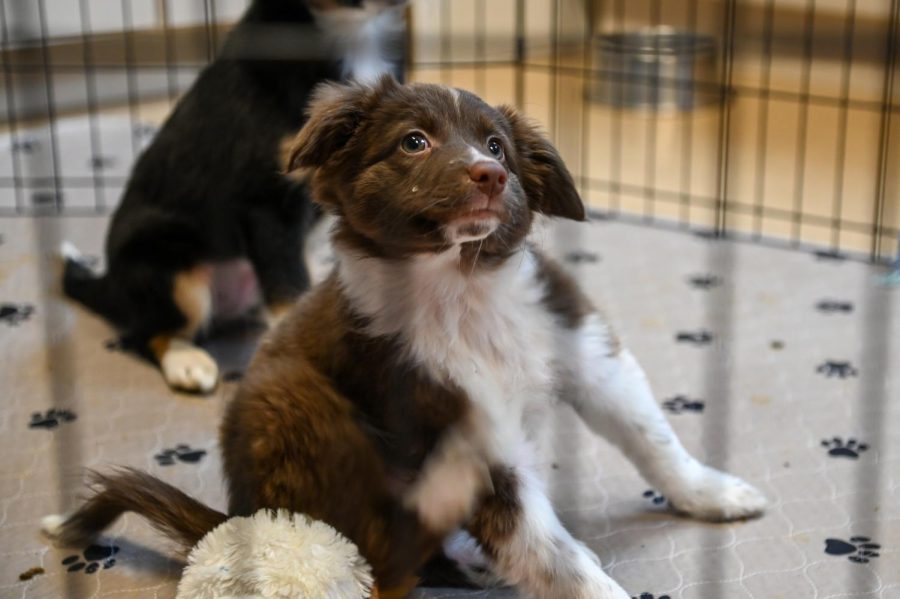Humane society still lending helping hand to furry friends
This puppy and his siblings were born at the Brookings Regional Humane Society when their mother was picked up as a stray. They are not ready to be adopted yet, but will be soon.
March 1, 2022
Hidden on the edge of town near the airport, the Brookings Regional Humane Society (BRHS) has been serving the Brookings community for more than 20 years, and the COVID-19 pandemic has been no exception.
Though the non-profit organization has had its challenges over the last two years, Director Maia Moore says their animal retention rates have been fairly steady throughout that time.
“Our animal intake and outcome numbers have been normal, haven’t seen big spikes, but we also haven’t seen any kind of drop off,” she said. “It’s just been doing everything by appointment, and that’s been going really well for us because we’re better able to manage our time.”
Additionally, the humane society has not seen many pet returns throughout the pandemic, an initial concern of many after the surge of adoptions during the first part of the pandemic.
“I think that they were thinking that that would be a thing, but it hasn’t really come to fruition,” Moore said.
Started in 1998, BRHS takes in cats, dogs and small animals like rabbits, guinea pigs and more. Animals that arrive at BRHS are also vaccinated and spayed or neutered before being made available for adoption.
The humane society also does not euthanize for time, space or treatable medical issues, meaning many of the animals housed there long-term have conditions that BRHS helps treat. While some animals, like Lily, an elderly dog with heart murmurs, can potentially be adopted in the future, others are cared for at BRHS for the rest of their lives.
The humane society also works with foster families to host some animals that need extra attention or don’t do well with other animals. Moore says most of these fosters take in young kittens or families.
“We don’t have a lot of dog fosters at the moment,” she said. “And when our dogs come in, if they’re potty-trained, good with dogs, cats, kids, they tend to get adopted before we even need to find them a foster home.”
The humane society has around eight to 10 animal care staff and two daytime staff along with Moore. Moore added that they accept volunteers as well, who can sign up for times to come help with animal care and cleaning. Volunteer times are by appointment due to COVID-19 and staff limitations.
For those interested in adopting, BRHS uses websites like Petfinder and Adopt a Pet to list their adoptable animals with information like breed, age, temperament and other important information for potential adopters.
BRHS also accepts appointment-based meetups with animals and will talk with adopters about what they are looking for in a pet.
“Our adoption process is fairly quick and painless,” Moore said. “It’s conversation based, like ‘what are you looking for?’ … Just trying to make sure that you and the animal are a good match and answer any questions you might have.”
Fees for animals vary depending on species, age and any special needs.
Because BRHS is nonprofit, it is completely supported by fundraising and donations from members of the community through either monetary donations or necessary supplies.
“The Girl Scouts made us blankets,” Moore said. “We’ve had little church youth groups that baked treats for the animals or things like that, or as big as … my kids do lemonade stands, bake sales or things like that to raise money.”
Other possible donations can include cleaning supplies like bleach, pet food, toys and more.

























